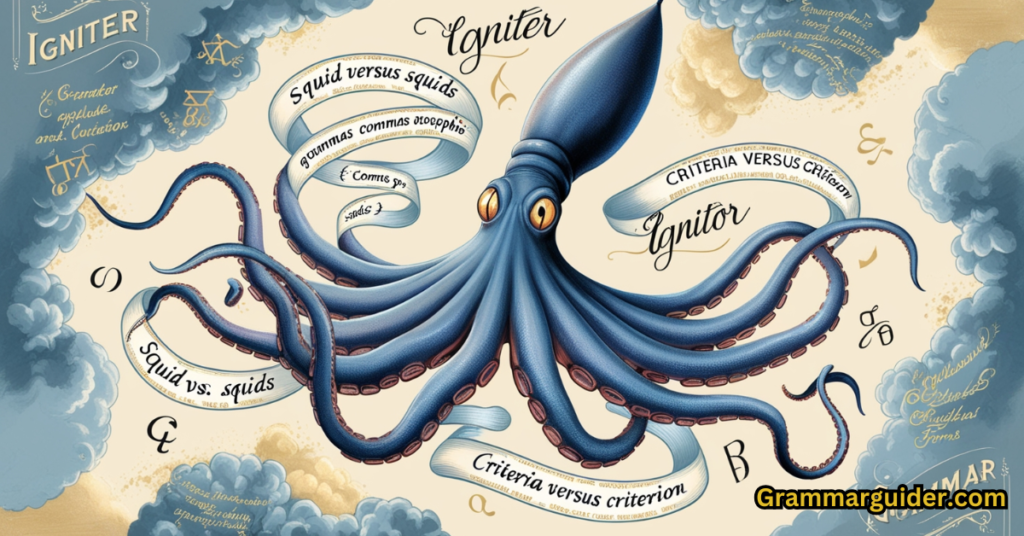When it comes to the English language, some of its rules can be puzzling, especially when it comes to plural forms. One such example involves the word squid. You might find yourself wondering, what is the plural of ‘squid’? Is it simply squid, or should it be squids?
This article will delve into the complexities of this word, offering detailed explanations, examples, and a closer look at how English handles plural forms.
Understanding the Squid Singular Form
Before diving into the plural of squid, it’s important to understand the singular form. In English, squid refers to a type of marine animal, specifically a mollusk. It is often associated with other ocean creatures, such as octopuses and cuttlefish, due to its shared classification in the cephalopod family.
When you’re talking about just one of these fascinating sea creatures, you use squid as the singular form. For example:
- “I saw a squid while diving in the coral reef.”
- “The squid darted away quickly when we approached.”
As you can see, there’s no ambiguity when using the singular squid. But when it’s time to talk about more than one, that’s when things get a little tricky.
Plural of Squid: The Debate
So, what is the plural of squid? Is it squid or squids? The truth is, both forms can be used, but their appropriateness depends on the context.
Squid as a Plural Form
In many cases, the word squid can be used both as a singular and plural form. This is because certain English nouns, especially those that come from other languages, tend to remain unchanged in their plural forms. This is a bit like how “deer” can refer to one or more of these animals. In the case of squid, it’s perfectly correct to say:
- “I saw several squid while exploring the deep ocean.”
- “The team of researchers studied the behavior of the squid in their natural habitat.”
In both of these examples, squid refers to more than one animal. This usage is especially common in scientific or formal contexts when discussing marine life.
Squids as a Plural Form
On the other hand, squids is the more conventional plural form in everyday language. It’s what you’ll likely encounter when talking about squid in informal contexts, such as at a seafood restaurant or when discussing multiple squid species. For example:
- “I’ve never seen so many squids in one place before!”
- “Did you know there are different types of squids found all over the world?”
When you’re referring to more than one squid in a casual or general context, squids is your go-to plural form.

Squid Grammar and English Plural Forms
The discussion of the plural of squid ties into broader English plural forms. English, like many other languages, has rules for turning singular nouns into plurals, but it also has exceptions, especially when it comes to words borrowed from other languages.
Many English words that end in a consonant (such as squid) follow the standard pluralization rule, adding an “s” at the end. For example:
- Dog -> Dogs
- Cat -> Cats
- Squid -> Squids
However, some words, particularly those with Latin or Greek origins, don’t follow this simple rule. Words like sheep or deer are irregular and do not change in the plural. Interestingly, squid shares this characteristic, and so it can be used as both a singular and plural noun in more formal contexts.
In contrast, when speaking informally, using squids is considered grammatically correct and natural.
Scenario Examples: Squids vs Squid
Let’s consider a couple of scenarios to illustrate when to use squid and squids. For these, let’s use email exchanges as an example.
Scenario 1: Scientific Research Email
Subject: Findings on Squid Behavior in the Deep Sea
Dear Dr. Harris,
I hope this email finds you well. I wanted to share some exciting updates from our recent expedition to the Mariana Trench. We encountered several squid during our dives. These creatures exhibited some fascinating behaviors that could lead to new discoveries about their communication systems.
We observed squid migrating in large numbers, which was quite a spectacle. It was clear that their movement patterns were influenced by the unique environmental conditions of the trench.
Looking forward to discussing this further with you!
Best regards,
Rachel
In this email, squid is used as a plural form because the context is formal and scientific. The writer refers to multiple squid without adding an “s,” which is common in research or academic contexts.
Scenario 2: Casual Conversation at a Seafood Restaurant
Subject: The Best Seafood I’ve Ever Had!
Hey, John!
I just got back from the coastal town where we had the most amazing seafood. We went on a boat tour, and the guide told us all about the different types of squids in the area. Apparently, there are over a dozen species living in the waters nearby!
I got to try some fried squids for lunch, and they were absolutely delicious! I’m definitely planning to go back next summer.
Catch you soon,
Mark
In this casual setting, squids is used as the plural form because it’s a friendly conversation, and the word is commonly used in informal speech.
The Squid Group Meaning
Have you ever wondered what a group of squid is called? The term “squid group” or “squad” isn’t commonly used, but a collection of squid in a large, organized group can be referred to as a school. This is especially true when they are swimming together in the ocean.
In contrast to squids in isolation, a school of squid can be quite mesmerizing to watch. Schools of squid often move in synchrony, using their ink and quick movements to evade predators. This group behavior is similar to what you see with other ocean creatures like fish or octopuses.
Differences Between Squid and Squids
The distinction between squid and squids may seem subtle, but it has more to do with grammar and context than anything else.
- Squid (plural and singular) is often used in more formal or technical discussions, such as scientific studies or marine biology articles.
- Squids is more common in everyday speech when people are talking about multiple squid in a general sense, especially when it’s less about the creature’s biology and more about them as a group of sea creatures.
Plural of Squid
| Term | Usage Type | Example |
|---|---|---|
| Squid | Singular & Plural (Formal) | “The squid is an amazing ocean creature.” |
| Squids | Plural (Informal) | “There are many types of squids in the deep ocean.” |
Sea Creatures Plural: How English Handles Them
The English language often has quirky rules when it comes to the plural forms of sea creatures and other animals. Take fish, for example—it’s the same word whether you’re talking about one or more. But with creatures like squid, there’s no one-size-fits-all approach.
Other ocean creatures also demonstrate this flexibility. Consider the word octopus. While most people say octopuses, it’s still technically acceptable to say octopi (although the former is more widely used). Similarly, shark can refer to one or many, just like squid.
Conclusion: Squid vs Squids
To summarize, both squid and squids can be correct, but they serve different purposes in different contexts. Squid is often used in more formal or scientific settings, while squids tends to appear in everyday speech. The plural of squid depends largely on the formality of the conversation and the speaker’s preference.
Understanding the plural of squid is essential for using the word correctly. Whether you’re diving into the ocean to explore squid grammar or simply enjoying a seafood dinner, knowing when to use squid versus squids will help you communicate clearly and effectively.

Harley Rose is a seasoned expert in English grammar and writing tips, blending years of knowledge and a love for language into her work. With a sharp eye for detail and a talent for making grammar accessible, Harley shares practical insights that help readers write with precision and flair. Her content is ideal for anyone looking to strengthen their writing skills and express themselves with confidence.

